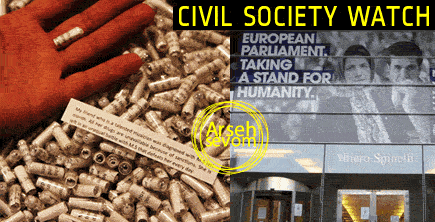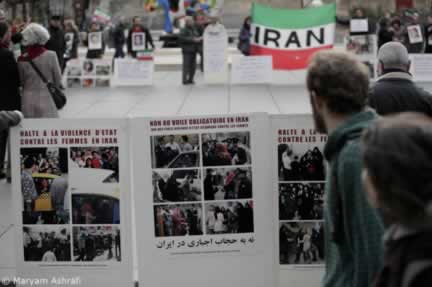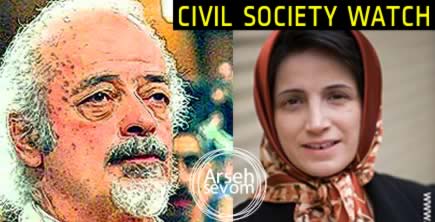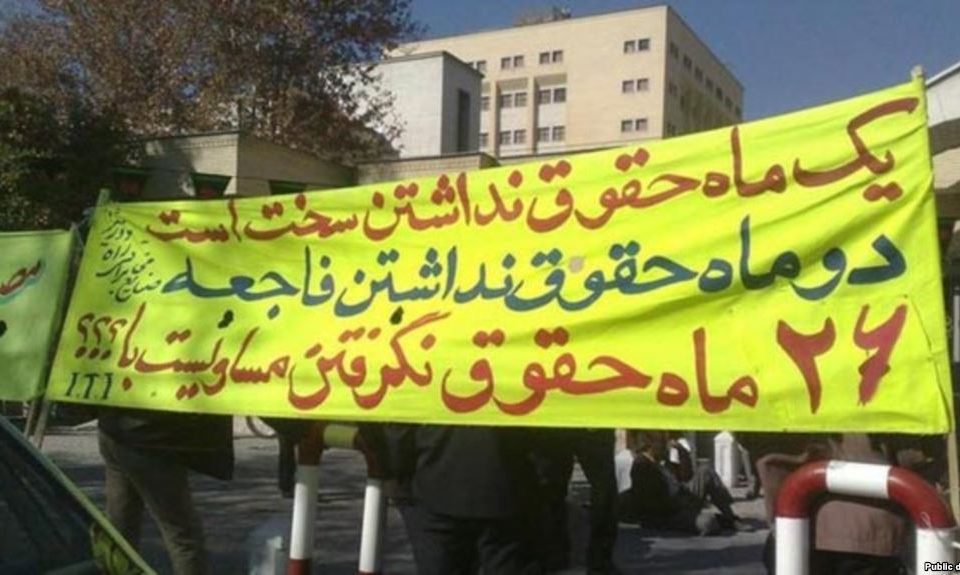
Letter from Maleki: Doubt Not, Tomorrow is Your Turn
December 5, 2012
Iran: Silent War While Life Goes On
December 20, 2012All over the world people who care about the fate of Nasrin Sotoudeh breathed a collective sigh of relief as word came in that her demands had been met, and she had ended her 49-day hunger strike. Dr. Mohammad Maleki wrote a powerful letter criticizing Iran’s Supreme Leader, the chief of the cybercrimes unit was sacked in the fallout of the investigation of the death of blogger Sattar Beheshti, and the Cyrus Cylinder travels to the US. HIV seems to be on the rise in Iran while nurses flee the country seeking better working conditions elsewhere. The UN has condemned Iran’s human rights abuses, demonstrators in Paris call attention to Iranian women who have been denied their rights, and German banks move to make transactions for humanitarian items such as medicine possible. Forced hijab comes with instruction now, there are reports that the death sentence against web programmer Saeed Malekpour has been lifted, and Asghar Farhadi is named as one of Foreign Policy’s Global Thinkers.
Doubt Not, Tomorrow is Your Turn
Dr. Mohammad Maleki, an academic and pro-democracy activist and the first post-revolution chancellor of the University of Tehran, wrote a courageous open letter to the Supreme Leader of Iran. (Arseh Sevom has published the English translation here.) Published in Melli-Mazhabi [fa], affiliated with Nationalist-Religious Coalition, the letter addresses Ayatollah Khamenei urging him “to accept that Iran is at the edge of collapse.” Dr. Maleki writes that instead of being praised for the image of the country portrayed by his supporters, the Leader should see domestic pressures, disagreements between the three powers, economic sanctions, and the dissatisfaction of the population. Dr. Maleki continues his criticism, citing Mr. Khamenei’s mismanagement and bad decision-making over his past two decades in office, urging his resignation, and a free and fair referendum about the state of the country.
UN Condemns Iran for Human Rights Abuses
Reuters [en] reports that on Tuesday, November on Tuesday 27 November condemned the U.N. General Assembly condemned Iran for widespread human rights abuses. Tehran dismissed the vote as politically motivated. The resolution on Iran, which was drafted by Canada and co-sponsored by other Western countries, received 83 votes in favor, 31 against, and 68 abstentions. The resolution was passed by the 193-nation assembly’s Third Committee, which focuses on human rights. It will be put to a formal vote next month at the plenary session of the General Assembly. The resolution received more yes votes than a year ago, when a similar text was approved with 80 in favor, 44 against, and 57 abstentions.
Interestingly, the resolution also criticized restrictions on candidates in the 2012 parliamentary elections and called on the authorities “to ensure free, fair, transparent and inclusive presidential elections in 2013 that reflect the will of the people”.
Elimination of Violence Against Women

Public demonstration in Paris highlighting the denial of rights of women. © Maryam Ashrafi
To mark the International Day for elimination of violence against women, the Independent Committee Against Suppression of the Iranian People called for a gathering in Paris on Sunday, November 25 in order to voice concerns against systematic violence against women in Iran. Participants held posters featuring the images of women who have had their rights violated by the Islamic Republic of Iran over the past 34 years. A great part of the gathering was focused on the case of Nasrin Sotoudeh’s hunger strike and her imprisonment.
The lack of attention to nurses, their needs, and difficult working conditions has forced nurses to either leave the country or quit their jobs. Although it is difficult to name a precise figure, statistics show an estimate of over 700,000 annual migrations of nurses to other countries. The secretary of the nurses’ union [Khane Parastar] [fa] believes the lack of attention by the health ministry to this sector and the lack of protective rules and regulations is the main problem for the mass exit of nurses.
Forced Hijab Supervised by Hijab Instructors at Schools
The plan to expand the culture of chastity and hijab is to kicked off in the schools too. Implementation strategies of the plan require institutes, ministries, and governmental and non-governmental organizations to take effective measures for its advocacy. Fars News [fa] reports that in order to institutionalize the culture of chastity and hijab for children, the Center for Women and Family Affairs of the Presidential Office has included the training of hijab instructors for schools in its agenda. Prior to this, a plan for gender segregation in preschools was suggested.
The ministry of health released its quarterly figures on HIV/AIDS. The latest official figure dates back to late March 2012, showing 24,290 affected by HIV. Iran-e Emrooz [fa] reports that out of this figure, 90.8% are male and 9.2% female. About 46% of them were between 25 and 34 when infected. This age group has the highest rate of infection among all. The latest statistics lists the manners of transmission as follows: 62.5% through sharing needles (addiction), 21.2% through unprotected sexual intercourse, and 9.3% from mother to child at birth. Shortly after the release of these official figures, experts announced that this is not the real figure. In addition to the some 23,000 known patients, there are hundreds of thousands of unknown patients, mainly affected through unprotected sexual intercourse.
On World AIDS Day, December 1, Arseh Sevom [fa] looked at available educational services and awareness raising methods in Iran on prevention and transmission of HIV/AIDS.
Good News Dribbles In!
Nasrin Sotoudeh Breaks Hunger Strike
Imprisoned lawyer Nasrin Sotoudeh finally broke her hunger strike on Day 49, December 4, 2012. International and national pressure finally swayed the authorities. For the first time, one lawmaker even said there might be a need for an investigation and news were out that legislators might visit Evin Prison. Arseh Sevom joins other activists in congratulating Ms. Sotoudeh’s family on the good news and reiterates the need for her immediate and unconditional release.
Asghar Farhadi Takes Another Honor
Foreign Policy [en] published the top 100 global thinkers of 2012 in its December issue. Oscar winning filmmaker Asghar Farhadi is listed as number 75 for “for his eloquent case for coexistence”.
The Cyrus Cylinder Travels to the US
The British Museum [en] announced that one of its most iconic objects, the Cyrus Cylinder, will tour to five major museum venues in the United States in 2013. This will be the first time this object has been seen in the US and the tour is supported by the Iran Heritage Foundation. The Guardian [en] quotes the director of the British National Museum, Neil MacGregor on the loan:
“It is a reminder that the problems in the Middle East can be understood only in the context of the long historical framework.”
As tension continued over last month’s death in detention of blogger Sattar Beheshti, the national police chief fired the commander of Tehran’s cybercrimes police unit [FATA] on Saturday for negligence, weakness, and insufficient control of his staff. The New York Times [en] notes:
“The public nature of his dismissal suggests that he will bear most of the responsibility for the death. In similar cases in the past, officials have been punished, but it is rare for them to be named and publicly dismissed on the same day.”
Lawyer Mahmoud Alizadeh Tabatabaei said that Saeed Malekpour’s “repentance” plea had been accepted and “the death sentence has been suspended.” Although this is good news, Malekpour’s relatives have yet to receive any documents confirming the suspension and are awaiting further developments.
German Banks to Ease Up on Iran for Humanitarian Purposes
Tough sanctions on Iran by the European Union and the US have led to the suffering of many in Iran due to a shortage of medicine because of banking restrictions. The German Foreign Ministry has called for banks to allow transfers to Iranian accounts for humanitarian purposes, which are not banned by EU sanctions. According to this letter, German banks are asked to look into how they can facilitate transactions between Germany and Iran for humanitarian purposes.
Earlier in October, the US Office of Foreign Assets Control (OFAC) also modified its rules and regulations to loosen sanctions on medicine sales to Iran.





